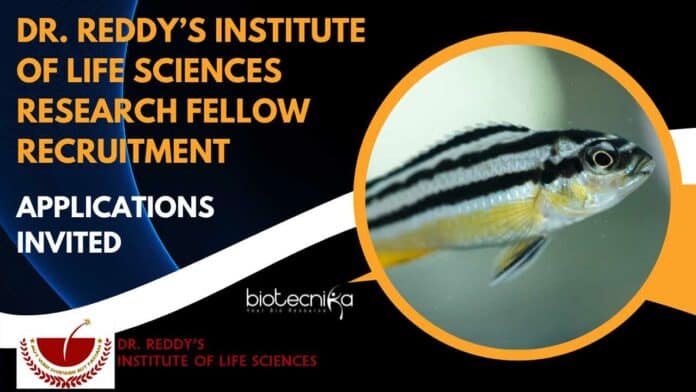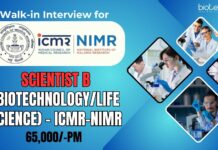Dr. Reddy’s Institute of Life Sciences Research Fellow Recruitment, Applications Invited
Dr. Reddy’s Institute of Life Sciences Research Fellow Recruitment, Applications Invited. DRILS Hyderabad Junior Research Fellow Job. Zebra Fish Research Fellow job opening at Dr. Reddy’s Institute of Life Sciences. Interested and eligible applicants can check out all of the details on the same below
Possible interview questions for the technical round of the Junior Research Fellow position are posted below
This job expires in
Application for Junior Research Fellow in DBT funded project
Applications are invited for the following Junior Research Fellow (temporary position coterminous with the project) position under a DBT funded research project on “Functional Analysis of PHLPP1 in Myogenesis: Implications for skeletal muscle dystrophies”
Name of the Post: Junior Research Fellow
No. of Posts: 01
Name of the Project: “Functional Analysis of PHLPP1 in Myogenesis: Implications for skeletal muscle dystrophies”
Duration: The duration of the fellowship is until the end of the grant (February 2025). However, the performance of the candidate will be rigorously reviewed every 6 months and the fellowship will be renewed only upon satisfactory performance.
How to Apply:
Qualified and interested candidates may send their curriculum vitae by
e-mail to [email protected] on or before 15th July 2023 with “DBT-PHLPP Project” as the subject line of the email. There will be two rounds of interview. Shortlisted candidates will be first interviewed through skype/telecon followed by a personal interview at Dr. Reddy’s Institute of Life Sciences, University of Hyderabad Campus, Gachibowli, Hyderabad.Fellowship: Rs. 31,000 plus 24% HRA (total Rs. 38,440)
Responsibilities:
- Literature search.
- Design, plan and execute experiments under the supervision of the scientist.
- Provide scientific support to the scientist in his research activities.
- Bookkeeping and maintenance of stocks and consumables.
Scope of experimental work:
- Cloning and site directed mutagenesis
- Generation and genotypic analysis of transgenic zebrafish
- Dissection of adult zebrafish, sectioning and slide preparation, and immunohistochemistry
- Imaging analysis of zebrafish larvae
Academic qualifications:
Post-graduate degree in Basic Sciences or Graduate/Post-graduate degree in professional course selected through a process described through any one of the following:
a. Scholars who are selected through National Eligibility Tests-CSIR UGC NET
including Lectureship and GATE
b. Selection process through National Level examinations conducted by Central Government Departments and their Agencies and Institutions such as DST, DBT, DAE, DOS, DRDO, MHRD, ICAR, ICMR, IISc, IISER etc.
Experience:
- 1-2 years in the areas of Molecular Biology and Cell biology. Candidates with prior hands-on experience with cell culture and zebrafish are preferred. Experience with dissections and immunohistochemistry would be an additional advantage.
Personal attributes:
- The candidate should be motivated, committed and should be able to work in independently and in teams.
Check the notification below
Possible interview questions for the technical round of the Junior Research Fellow position:
- Can you explain your understanding of the research project on “Functional Analysis of PHLPP1 in Myogenesis: Implications for skeletal muscle dystrophies”? How do you envision your role in this project? Answer: The research project aims to explore the functional analysis of PHLPP1 in myogenesis and its implications for skeletal muscle dystrophies. My role in this project would involve designing and executing experiments under the supervision of the scientist, providing scientific support in research activities, and contributing to the literature search. I would work towards understanding the molecular mechanisms involved in myogenesis and the potential therapeutic implications for skeletal muscle dystrophies.
- Have you previously worked with cloning and site-directed mutagenesis techniques? Can you provide examples of experiments you have conducted using these methods? Answer: Yes, I have experience in cloning and site-directed mutagenesis techniques. In a previous project, I successfully cloned specific genes of interest into expression vectors and introduced site-specific mutations using mutagenesis methods such as PCR-based approaches. These techniques allowed me to study the functional consequences of specific mutations and investigate their impact on protein function.
- Can you describe your familiarity with zebrafish as a model organism for research? Have you conducted any experiments involving zebrafish, such as transgenic analysis or immunohistochemistry? Answer: I have prior experience working with zebrafish as a model organism in research. In one of my projects, I generated transgenic zebrafish lines by introducing specific genetic constructs into zebrafish embryos. I also performed genotypic analysis to confirm the presence of transgenes. Additionally, I conducted dissections of adult zebrafish, prepared histological sections, and performed immunohistochemistry to visualize specific proteins or cell markers.
- How comfortable are you with literature search and providing scientific support in research activities? Can you give an example of a project where you conducted extensive literature search and contributed scientifically to the research? Answer: Literature search and scientific support are integral parts of my research experience. In a recent project, I extensively reviewed scientific literature related to a specific signaling pathway to gain a comprehensive understanding of its role in a particular disease model. This literature search helped me identify knowledge gaps and design experiments to explore novel aspects of the pathway. I actively contributed to discussions with the research team, providing scientific insights and suggesting further experimental approaches based on the literature findings.
- How do you handle working independently and as part of a team? Can you provide an example of a project where you demonstrated both independent work and effective collaboration within a team? Answer: I am comfortable working both independently and collaboratively in a team environment. In a previous research project, I had the responsibility of designing and executing experiments individually, analyzing the data, and drawing conclusions. Simultaneously, I actively participated in team meetings, shared my findings, and collaborated with other team members by offering assistance when needed. This balance between independent work and effective teamwork allowed us to achieve research goals efficiently.
Remember, these are sample questions and answers. It’s essential to tailor your responses to your own experience, skills, and knowledge.
Editor’s Note: Dr. Reddy’s Institute of Life Sciences Research Fellow Recruitment, Applications Invited. Please ensure you are subscribed to the Biotecnika Times Newsletter and our YouTube channel to be notified of the latest industry news. Follow us on social media like Twitter, Telegram, Facebook





































